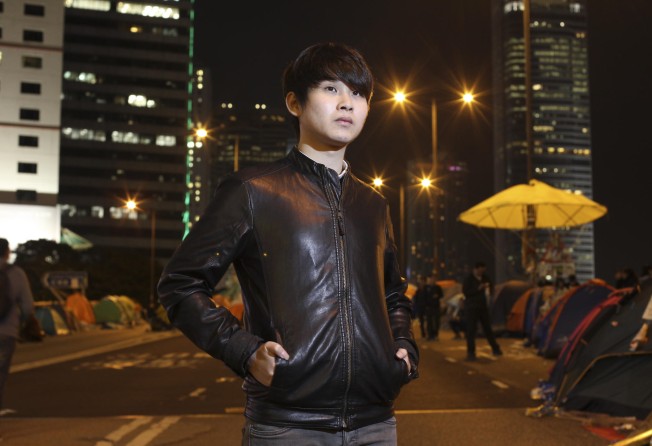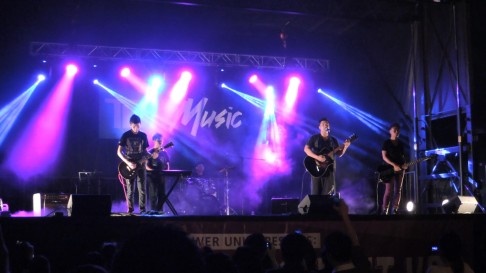Raise the Umbrella: Occupy anthem may become Hong Kong's song of the year
Tune penned after the tear-gassing of Occupy protesters is in the running for song of the year

When Lo Hiu-pan wrote a song in reaction to the tear-gassing of pro-democracy protesters a few months ago, he never imagined it would become one of the most representative anthems of Hong Kong's "umbrella movement".
Raise the Umbrella has not only captured the zeitgeist of the protest movement, it's in the running to be named "My Favourite" song of the year in Commercial Radio's annual music awards. A release by the station yesterday showed that Umbrella made the top five songs; the final result will revealed at its awards ceremony on New Year's Day.
(While other Commercial Radio awards are based on airplay, the "My Favourite" categories, which include male artist, female artist and group, are based on an online one-person-one-vote system.)
Lo, 25, composed the melody and lyrics of Raise the Umbrella in less than 48 hours, after riot police fired tear gas at protesters in Admiralty and Central on the night of September 28.
"As a Hongkonger and music lover, I wanted to create a kind of 'supply' for the protesters," Lo recalls of his creative process. "I simply hoped my song could comfort and encourage everyone supporting the movement for democracy."
He recorded Raise the Umbrella in a tiny rented studio in Kwun Tong, uploaded it to YouTube under the pen name Pan, and in an attempt to reach a wider audience, contacted local pop star Denise Ho Wan-see, who he knew was a supporter of the movement. Ho was receptive, and enlisted the help of music industry peers such as singer Anthony Wong Yiu-ming and lyricist Lam Jik.
Then on October 4, less than a week after the protests broke out, Lo took the stage at the Admiralty occupied area to perform a modified version of Raise the Umbrella live for the first time, together with Ho and Wong.
A new version of the video, uploaded on YouTube, garnered several thousand views within a few days.
"Lam Jik reworked the lyrics and we recorded the song with various artists," Lo says, smiling. "The power of working together is truly amazing. Within three days, we were able to complete everything - from the instrumentals and vocals, to the music video - and they were all done very professionally. If there had been no passion involved in this production, that wouldn't have been possible."
Lo has no formal training in music and describes himself as a "part-time musician" who first began writing songs in Primary Five. In 2008, he was hired as a composer by the East Asia Music Company, where he wrote songs for local artists. Now a sound-effects producer for a toy manufacturer, Lo says he enjoys any work related to music.
Although Lo had been writing songs for fun for years, he admits he rarely shares them online, let alone directly contacting artists about them. "At first, I was worried that people might think I just wanted fame. But I learned that in times like this, you should just do what you know is right."
I think there's a lack of songs about everyday life that can send out positive energy in Hong Kong
Lo believes the response to his song reflects how Hong Kong society is becoming increasingly open to music that focuses on social issues faced by residents. He believes music has the power to communicate a strong message and influence the way other people think.
"The message I want to bring out through my song is simple: keep on persevering in this struggle for democracy. Do not give up."
Lo has plans to release his own CD of original songs in the near future. "I want my music to be a sanctuary for people. I want my songs to be about people who find life tough, and about the difficulties they encounter. In general, I think there's a lack of songs about everyday life that can send out positive energy in Hong Kong."

"I wasn't very passionate about the issue of political reform initially, but the tear gas and triads in Mong Kok made me furious," Cheang says. "The tipping point came when my friends were discussing recent events and said something that I found extremely stupid.
"These guys are close friends of mine and I didn't want to lose our friendship because of politics. So I refrained from responding, contained my anger and frustration, and went home. That was when I came up with the chorus and tone, and built the song up from there." Cheang finished writing it in just a few hours, and recorded himself singing the song and playing a guitar. He posted the video on his Facebook account that night before going to bed. He woke the next day to find his post had been shared more than 2,000 times on the social network, and realised his song had gone viral.
"I think the reason it became so popular overnight is that everyone has friends or seniors who will say something stupid to you," says Cheang. "You cannot rebut them, or you'll feel terrible about it. This rant hits the nail on the head in that respect because everyone can relate to such an experience."
Although, on the surface, his song is targeted at people who oppose the umbrella movement, Cheang explains it's about more than opposing political stances.
"I think there's no definite right or wrong to anything - if you have considered arguments from both sides and have formed your own analysis and reasoning, any point could be valid and worth debating. What infuriates me is hearing people say naive and impulsive things that don't sound like something an adult with brains could utter."
The overwhelmingly positive response has encouraged Cheang to produce more songs in a similar vein - he's currently working on a song voicing the views of the post-'80s and '90s generation.
"I have never seen this as a personal achievement - I just feel that I have helped my generation of Hongkongers vent our frustrations."
In Canada, 811, a Toronto-based band, has also created a song in support of the pro-democracy protesters. Its five members (vocalist Steven Ly Cheuk Foh, bassist Kelvin Ling Kar-fai, John Wong Ka-yun on keyboards, Vivian Au Hoi-ting on drums, and guitarist Nelson Tai Wing-chun), whose families emigrated from Hong Kong when they were little, spent three days writing, recording and producing their song, Freedom, #UmbrellaRevolution.
"I've never seen anything like this happen in Hong Kong: people being so united by a common cause, which we fully support," says Ly, who kicked off the songwriting process after watching television footage of police firing tear gas at protesters. "We can enjoy freedom in Canada, and we want other parts of the world to have it as well."
Although the protest sites have now been cleared, Ly believes that determination will see the pro-democracy protesters through.
"The message we want to bring across with our song is, keep holding on to your beliefs and keep fighting for freedom."
Although four of the band members have Canadian citizenship, they speak and sing in Cantonese.
"That's because we are still Hongkongers at heart and this song is for the people of Hong Kong," bassist Ling says.
"We are not a part of the movement, but as overseas Chinese, we are onlooking supporters."
Baptist University social work lecturer Shiu Ka-chun believes there is an increasingly close link between social activism and creativity: "During the umbrella movement, protesters used different art forms to express themselves and awaken others - it is a huge integration of political struggle and art."
With the emergence of songs exploring social issues, Shiu hopes such themes will become more prominent in Hong Kong's mainstream music scene. "Perhaps it won't be dominated by love songs any more," he says, smiling.
